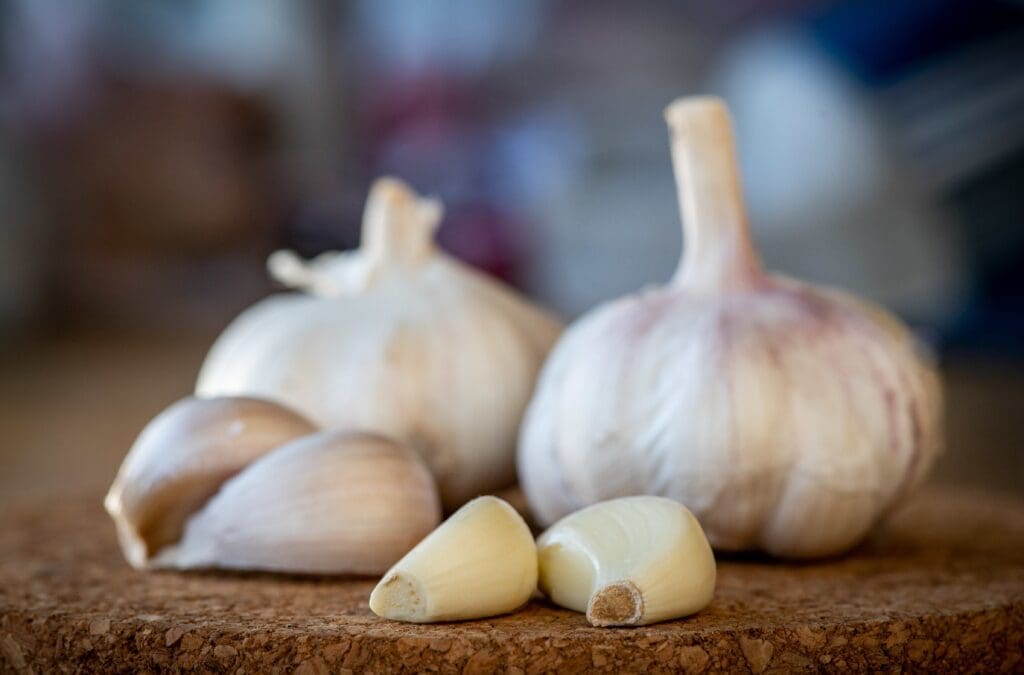
Allium sativum
Latin name: Allium sativum
Short name: All-s
Common name: Garlic | Common Garlic | Cultivated Garlic | Poor Man’s Treacle | Nectar of the Gods
Primary miasm: Psoric Secondary miasm(s): Sycotic
Kingdom: Plants
Family: Amaryllidaceae
- Symptomatology
- Remedy Information
- Differentiation & Application
Allium sativum is a perennial bulbous plant of the family Amaryllidaceae, native to Central Asia and cultivated worldwide as a culinary and medicinal herb. Its strong odour and pungent taste arise from organosulphur compounds, chiefly allicin, formed when the bulbs are crushed. Used for millennia as a food, spice, and medicine, garlic has been valued for its antimicrobial, circulatory, and digestive properties. In homeopathy, the fresh bulb is macerated in alcohol to prepare the mother tincture. The remedy acts prominently on the digestive system, especially in sluggish, atonic states, and on the respiratory tract and circulatory system in conditions arising from rich, fatty diet, overindulgence, or sedentary habits.
Widely used in cooking for flavour; medicinally for lowering blood pressure, improving cholesterol profile, stimulating digestion, and as an antimicrobial agent. Historically used to ward off infection during epidemics, to expel intestinal worms, and to improve endurance and vitality.
First introduced into homeopathy by Dr. Petroz in the mid-19th century; later confirmed by Dr. C. Hering [Hering, Allen]. Proving symptoms centre on the alimentary canal, with secondary effects on the respiratory tract and circulation.
- Digestive system – Stomach, intestines, portal circulation [Hering, Clarke].
- Liver and portal veins – Congestion, sluggish metabolism.
- Respiratory tract – Bronchial mucosa in catarrhal states.
- Circulatory system – Chronic vascular congestion, sluggish peripheral circulation.
- Skin – Irritative eruptions in sensitive subjects.
- Musculoskeletal system – Chronic gouty and rheumatic tendencies from rich diet.
- Continued motion in open air
- Simple, light diet
- Passing flatus
- Gentle exercise improving digestion
- Sedentary lifestyle [Clarke]
- Overeating, particularly of meat, fat, or highly seasoned food
- Alcoholic beverages
- Cold, damp weather aggravating rheumatic pains
- After meals, especially large or late ones
- Nux vomica – Gastric and hepatic congestion from dietary excess; more nervous irritability.
- Carbo vegetabilis – Extreme flatulence and collapse tendencies; colder constitution.
- Lycopodium clavatum – Hepatic congestion with flatulence; more right-sidedness and aggravation 4–8 p.m.
- China officinalis – Bloating after loss of fluids; more periodic weakness.
- Complementary: Nux vomica, Lycopodium.
- Follows well: Carbo vegetabilis after collapse; China after loss of fluids.
- Antidotes: Pulsatilla (for gastric aggravation from rich food), strong coffee in medicinal excess.
Allium sativum typifies the consequences of overindulgence in rich food and sedentary living — gastric and hepatic congestion, flatulence, sluggish portal circulation, and vascular engorgement. The essence is digestive oppression with systemic sluggishness.
Indispensable in sluggish digestion of the plethoric, gouty, or sedentary. Useful in chronic bronchial catarrh of old people who have lived richly. Low potencies (mother tincture–3x) are often employed in gastric disorders; higher potencies for constitutional states.
Mind
- Irritability from gastric disturbance
- Aversion to mental work after meals
Head
- Congestion after meals
- Vertigo from hepatic congestion
Stomach
- Digestion, slow, with weight after meals
- Eructations tasting of garlic
- Heartburn from rich food
Abdomen
- Flatulence, fetid
- Congestion, liver
Rectum
- Haemorrhoids, congested, burning after stool
Respiration
- Cough, chronic bronchial, with tough mucus
Skin
- Eruptions from topical contact with garlic
Generalities
- Sedentary lifestyle aggravates
- Rich food aggravates
- Hering, C., Guiding Symptoms of Our Materia Medica – Original proving notes; gastric and hepatic sphere; modalities from diet.
- Clarke, J. H., A Dictionary of Practical Materia Medica – Constitution, keynotes in digestive and respiratory symptoms; gouty and rheumatic aggravations.
- Allen, T. F., Encyclopaedia of Pure Materia Medica – Full proving details; clinical confirmation in gastric, hepatic, and bronchial states.
- Boericke, W., Pocket Manual of Homeopathic Materia Medica – Condensed keynotes; dietary aggravations and portal congestion.
